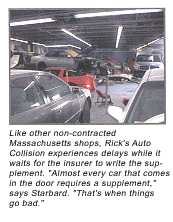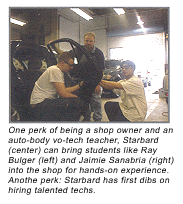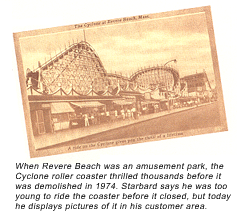arce, and businesses along North Shore Road share the turf with, of all things, body shops.
So when Rick Starbard heads to the seashore, it’s not to work on his tan but to put in a shift at his shop – Rick’s Auto Collision. Located along Revere Beach, the shop is situated near what was once a famous amusement park and seaside resort.
“The way the body shops are situated around here, we’re right on top of each other,” says Starbard. “One shop is a quarter-mile away, and further down the road, there’s three more in the same stretch. You go a mile up in the other direction and you hit the dealer shops. In some parts of the country, body shop managers say their competitors are stealing their work. That’s really not an issue here.”
Starbard says that even though shops are congested, an atmosphere of friendly competitiveness exists in Massachusetts. Did he say friendly? He sure did.
This “friendliness” may be due – at least in part – to the fact that state regulations make DRPs illegal in Massachusetts. (See “How’d They Do That?” for more on Massachusett’s unique collision market.)

Shop’s Ahoy!
Starbard gets 90 percent of his business – many of whom are lobstermen and fishermen –through word of mouth. When customers drive through his gates, they’ve already decided he’s fixing their car.
And a percentage of Starbard’s customers don’t need a loaner car when they drop off their wrecked vehicle since many of them are heading to Boston or Logan Airport.
“A mile and a half down the street is a Blue Line station, which is the subway to those two places,” says Starbard. “Our commuter customers can bring their car to us, and we drive them down the street and drop them off at the train station. When their car’s done, we pick them up at the station. It’s convenient.”
In addition to always looking for ways to make life more convenient for his customers, Starbard is also always on the lookout for ways to keep his bays full. His most recent discovery: bedliners.
Starbard bought a Rhino Linings dealership in September 2002. Between buying the dealership, the equipment and the initial materials from Rhino – as well as adapting the building to do it in –Starbard says it probably cost him around $50,000 to get his bedliner business up and running.
“I think the return would be great just by doing two a day,” he says. “Some weeks we average that, and some weeks we do as few as six jobs. We need to be into it for a year before I’ll really know what our average figures are going to be. For the first six months, we’ve figured that our gross profit per vehicle is between $200-$240. That isn’t bad. The part of the building that we do it in was only used before to clean cars, and that was a free service. It didn’t cost a lot more money because we didn’t go out and construct another building.”
How’d Starbard get involved with bedliners?
“We got involved because customers were asking us if we knew who did bedliners,” he says. “Because we’re right on the coast, we have a lot of fishermen and lobstermen as customers. We see the damage that can be done to a truck bed that has a drop-in liner – the salt water gets underneath it. I realized that the demand for bedliners is nationwide, and that there’s a market demand here that’s geographic.”
Starbard’s learned other geographic facts about the local bedliner market as well. For example, a customer doesn’t think about his truck bed when it’s buried under snow. But, then again, when there’s snow, people slide into each other and need body work. And all those wintertime collision customers are potential bedliner customers. Starbard says that last winter, he had a lot of inquiries about bedliners, and his hunch was that when the snowy weather subsided, his bedliner business would pick up. His hunch was correct.
“Most of the time, we have bedliner jobs in here,” he says. “It’s been so busy in the body shop that we had to hire a guy solely to do the bedliner jobs.”
Besides the extra money that bedliners bring in, Starbard says he also likes the fact that his bedliner business allows him to operate in the free market system.
“Just like the rest of America, when customers come in, you give them a price and they either take it or they don’t,” he says. “You don’t have somebody saying, ‘Well, you know, I really think you should do it for $50 less,’ like the insurance industry says to us every day.”

DRP-Free – Sort Of
Good word-of-mouth advertising is particularly important to Starbard since he refuses to sign any contracts with insurers.
“Wait a second. I thought you said earlier that Massachusetts is DRP-free?”
I did. But nothing’s ever as simple as it seems.
In the state of Massachusetts, insurers work with body shops through what’s called the “referral system.” In Massachusetts, legislation prohibits insurers from recommending specific shops to their customers. Insurers must write an estimate and give the customer a list of every qualified body shop in the state.
But, with like nearly everything in life, there’s a catch: The names of the insurer’s preferred, contracted shops are permitted to appear bold or highlighted on the list.
How does a shop in Massachusetts get its name in bold? By signing a contract promising something – whether it be a fixed labor rate, storage rate, etc.
“What the shop gets out of it is that customers perceive them to be chosen by the insurance companies,” says Starbard. “The shops give no parts discounts, but they agree to use aftermarket parts without putting up a stink. What the insurer gets out of it is a group of shops that will work for a labor rate that existed when the system was implemented in 1988 – $32 an hour. That’s why in Massachusetts we rank among the lowest in labor rates in the country, but back in the mid-’80s, we were among the highest.”
Another thing many shops get out of signing a contract is that they’re permitted to write their own supplements, greatly reducing turnaround times. Non-contracted shops must wait for the insurers to provide supplements.
But if Starbard has his way, this referral program will one day be replaced with a system that eliminates the biggest flaw of DRPs (“steering,” says Starbard) and the biggest flaw of the referral system (“non-contracted shops can’t write their own supplements”).
While such a program could set a precedent for the entire collision repair industry, the Massachusetts Auto Body Association (MABA) – and shop owners like Starbard – are focusing their attention solely on Massachusetts. Unified and organized, MABA hopes to help shape the future of the industry through political involvement.

The Teach on the Beach
Starbard has proven himself a diversified shop owner who thrives in a unique market. He’s so diversified, in fact, that he even has a second career – teaching at Lynn Vocational Technical High School, a local NATEF-certified vocational school. What’s he teach? Autobody, of course.
“Teaching is full-time, so I come into the shop every day from three to seven,” says Starbard. “I bring my students here all the time. The guy who does my Rhinos is a former student.”
How did this second career come about? Starbard stayed involved with the school he graduated from, serving on advisory boards and co-oping with autobody students. He actually turned down the school’s first offer to teach, but when the request came up again seven years ago, he accepted and never looked back.
Busy as he is, Starbard says the fact that he’s still running a body shop gives him credibility with his students and also gives them hope that there’s a future for them in collision repair.
“It’s not like it’s something I did 20 years ago and now I teach it – I still do this every day,” says Starbard. “[It makes a difference when] the kids know that what the teacher is teaching is what he does, so he knows what he’s doing, using up-to-date methods, using the best equipment. The students know that I own a shop and have a ton of friends who own body shops. They know that there’s a future there, and they jump at it.”
But it takes a collaborative effort among shops to get the attention of a new generation of potential collision repairers.
“There’s got to be a better connection between shops and the vocational schools,” says Starbard. “Everybody’s dying for help, but they want them all to be experienced and with their own tools.
“Guys like that aren’t moving around. The good guys are being well-taken care of and they’re happy where they are. Really the only way is to take these kids and bring them along and nurture them a little bit because guys with 15 years experience and $30,000 in tools aren’t going to fall out of the sky.”
Starbard practices what he preaches. Teaching has turned out to be a handy recruiting tool. Starbard identifies the best students in his classes for potential employees and for referrals to shops where he knows they’ll be well taken care of.
“The qualities that make the best students are work ethic and personality. I spot those qualities because I have these kids for three years. I want them to work hard, but also to have fun.”
The Waves of Change
Starbard has found many ways to have fun during the 20 years he’s been in business. He’s also gotten to know the movers and shakers of his industry – and become one of them. He’s currently vice president of the Alliance of Automotive Service Providers (AASP) for Massachusetts and Rhode Island, he’s served as AASP’s collision director and he previously served on MABA’s board of directors for 12 years. He was also recently part of a group who met with the National Association of Independent Insurers (NAII) and some of the executives of the larger insurers in Massachusetts “to come up with a hybrid plan that’s not DRP – something that works for everybody.”
Starbard says that to work for everybody, the plan will have to eliminate the supplement struggle that currently exists between insurers and non-contracted shops. Doing this will help to streamline claims handling and will reduce expenses, including rental car costs. NAII figures show that in Massachusetts, the average stay in a rental is three days longer than the national average. Faster turnaround times will get the customer out of the rental car sooner.
“The delay happens with the supplement process,” says Starbard. “Almost every car that comes in the door requires a supplement. That’s when things go bad.
“The appraiser may take up to three days to come down. Then you haggle back and forth, they go back and write the car up. It could be a week before you even see the appraisal, and that’s adding a week to the rental car. This is where the highest portion of the claims-handling costs are – in the supplement process. It’s where our down time exists, where our loss of production exists. What we’re saying to them is, ‘Let us write the supplement and stop the waste.’ ”
But AASP, MABA and shop owners like Starbard aren’t just voicing their opinions and concerns to legislators and insurers. They’re also working hard to educate consumers about insurer contracts and the way they affect repair shops.
“When a customer starts to think about it,” says Starbard, “how can a shop represent a consumer’s best interest when they’ve got a signed contract with an insurer that they don’t want to jeopardize?”
Writer Bob Bissler is senior editor of BodyShop Business.
| Shop Name: Rick’s Auto Collision, Inc.
Location: Revere, Mass. Established: 1983 Square Footage: 4,500 square feet President: Rick Starbard No. of Employees: 7 full time – 2 body techs, 1 prepper, 1 painter, 1 bedliner tech/prep, 1 secretary, 1 shop manager Average Repair Volume: 40 cars/month Average Repair Cost: $2,500 |
In 1988, Massachusetts legislators adopted insurance reform regulations to keep out DRPs – without ever even mentioning them. But how long can it last? Most body shop owners in Massachusetts remember what happened in 1988. That was the year the state adopted regulation 211 CMR 123, which came to be known as “insurance reform.” It clearly laid out specific rules as to how insurers may deal with body shops and consumers during the claims process. What makes this legislation special? The way it’s worded makes DRPs, as they exist in the other 49 states, non-functional in Massachusetts. That’s not to say that body shops have no contracts with insurers – they do, just like shops with DRP agreements. The difference in Massachusetts is that insurers are prohibited from steering work to their contracted shops – at least to a degree. The legislation states that, “An insurer shall not provide a separate list containing only its referral shops.” It also states that insurers “must provide that every claimant will be given a single list containing the names and locations of all registered repair shops.” This arrangement has come to be known as the “referral system.” Under these regulations, insurers are permitted to have contracted shops, but they can’t pick and choose them – they must accept any qualified shop that wants to enter into a contract. So if the insurer is required to provide claimants with a list of every qualified shop, how can contracted shops get any additional volume? Because the rules allow for the names of an insurer’s referral shops to appear in bold, with an asterisk or highlighted on the list. Is this system really any better? Does it really do anything to prevent steering? To find out, we asked Steve Regan, spokesman of the Massachusetts Auto Body Association, Inc. (MABA). BSB: Are DRPs actually illegal in Massachusetts? Regan: DRPs are not illegal, per se. It’s just that Massachusetts consumer protection and anti-steering laws make them unworkable. … The words DRP appear nowhere in Massachusetts law. Massachusetts is the only state without DRP programs. BSB: Isn’t the referral system like a DRP? Regan: The system is not like DRPs because those programs are initiated by insurers as they see fit. Insurers decide what shops can and cannot participate and generally are allowed to steer their claimants to those shops. The referral system was established in 1988 by the Massachusetts legislature. It’s governed by Massachusetts regulations 211 CMR 123, which provide specific parameters for insurers regarding criteria for shop participation and denial or removal from lists, consumers’ right to information, consumers’ right to choose a shop of their own, timeliness of payment, guarantees and other factors. BSB: What are referred shops giving to insurers in exchange for being a “contracted” shop? Regan: Referral contracts, like DRP contracts, contain insurer-established criteria such as a fixed labor rate, storage rate, use of parts and procedures as recommended by the insurer. They must also indemnify the insurer for any poor repairs – even though the insurer would use the pitch on claimants that if they use a referral shop, the insurer guarantees the work. Once you sign, your name can appear in bold (or other form of highlight) on a countywide list that the insurer is required to give all claimants. BSB: Are MABA members friendly with insurers? Regan: Our members consist of those who are very friendly to those who aren’t friendly at all. Our association takes no issue with members and how they wish to deal with insurers. It’s their decision. MABA has adopted a policy of working with insurers that respect our members as businessmen and women and are willing to work together to come up with viable solutions to our industry problems. We’ve also taken legal action and filed complaints against individual insurers that aren’t willing to do so. BSB: Do your members feel like insurers exert less “control” over them than repairers in other states? Regan: I believe most all collision repairers believe they’re subject to some control by insurers. The level of control truly depends on the insurer and the shop’s knowledge of its rights and the customers rights under the insurance contract, plus applicable laws and regulations. We believe members of MABA are in greater control of their businesses because of their knowledge, as stated above, and because of the efforts of the association:
MABA has a full-time lobbyist at the state house, legal counsel and public relations professionals to ensure we stay competitive. BSB: Would you say insurers don’t “control” the Massachusetts market? Regan: They’re not in total control, but the labor rate issue alone shows the strength of insurer control in every state to some extent. We in Massachusetts have balanced that control by offsetting low rates with higher levels of P-page procedures, by getting paid for many non-included items and by teaching our members how to negotiate a better ticket. BSB: Many say that DRPs create a cutthroat marketplace because shops become desperate to bring in business. Is your market friendlier because you don’t have DRPs? Regan: The referral issue causes some disagreements, but I feel we’re more cohesive here in Massachusetts without DRPs. |













